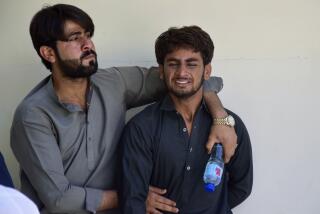Pakistan executes two terrorists, presses military offensive
- Share via
Reporting from Peshawar, Pakistan — Pakistan executed two convicted terrorists on Friday, and the army said it killed 67 militants in an expanding offensive following the massacre of children at an army-run school.
The executions were the first carried out against civilians in Pakistan since 2008 and came after Prime Minister Nawaz Sharif lifted a moratorium on the death penalty to assuage public calls for swift justice against militants following the attack at the Army Public School in Peshawar that killed 132 children and 16 staff members.
Pakistani news media reported that the convicted planner of a 2009 attack on Pakistani army headquarters, known as Dr. Usman, and Arshad Mehmood, who plotted to assassinate former President Pervez Musharraf, were executed at the district jail in the city of Faisalabad.
The Pakistani army quickened the pace of military action against extremist sanctuaries in the northern tribal areas. Security forces ambushed a group of militants moving from the Khyber tribal region toward the border with Afghanistan, triggering a firefight that killed 22 militants and injured three soldiers, the military said in a statement.
Officials in the Khyber region said an additional 15 militant suspects were killed when Pakistani fighter jets struck hideouts in the Tirah Valley. Thirty militants were killed in the Kurram tribal area after security forces responded to an attack on a checkpoint early Friday morning, officials said.
Officials in Khyber Pakhtunkhwa, the province where the school attack occurred, asked the federal government to carry out strikes against suspected militants in Afghanistan if the Afghan government did not take action to dismantle their sanctuaries.
Provincial Information Minister Mushtaq Ghani said the government had credible intelligence reports that the plot to attack the school was hatched across the border by Pakistani Taliban leaders living in Afghanistan. The intelligence was shared with the Afghan government in meetings this week in Kabul, Ghani said.
“The federal government should take up the matter with the Afghan government and ask for action against terrorists,” Ghani said. “If the required results are not achieved, then Pakistan should take action against terrorists hiding in Afghanistan.”
Also Friday, the accused plotter of the 2008 Mumbai terror attacks was ordered back into a Pakistani jail after his release on bail drew outrage in India.
Zaki-ur-Rehman Lakhvi was detained under Pakistan’s Maintenance of Public Order Act, his lawyer told reporters. He is to be held for three more months.
Lakhvi’s release Thursday on $5,000 bail triggered swift condemnations from India and raised questions about the Pakistani security establishment’s pledges to end a policy of supporting militant groups that attack arch-rival India.
Lakhvi, the operations commander of the Lashkar-e-Taiba militant group, is one of seven Pakistani nationals facing trial for the attacks in India’s commercial capital that killed 166 people in November 2008.
The Pakistani government’s prosecutor in the case, Muhammad Azhar Chaudhry, said he would go to court Monday to challenge the decision by Pakistan’s anti-terrorism court to grant Lakhvi bail.
Lawmakers in New Delhi passed a resolution denouncing the bail decision and asked the Indian government to take “all steps in its power, including through its relations with foreign countries, to put pressure on Pakistan to bring this matter to a satisfactory conclusion.”
Indian Prime Minister Narendra Modi said Lakhvi’s release, two days after the school attack, was “a shock to all those who believe in humanity.”
For more news from South Asia, follow @SBengali on Twitter
More to Read
Sign up for Essential California
The most important California stories and recommendations in your inbox every morning.
You may occasionally receive promotional content from the Los Angeles Times.











